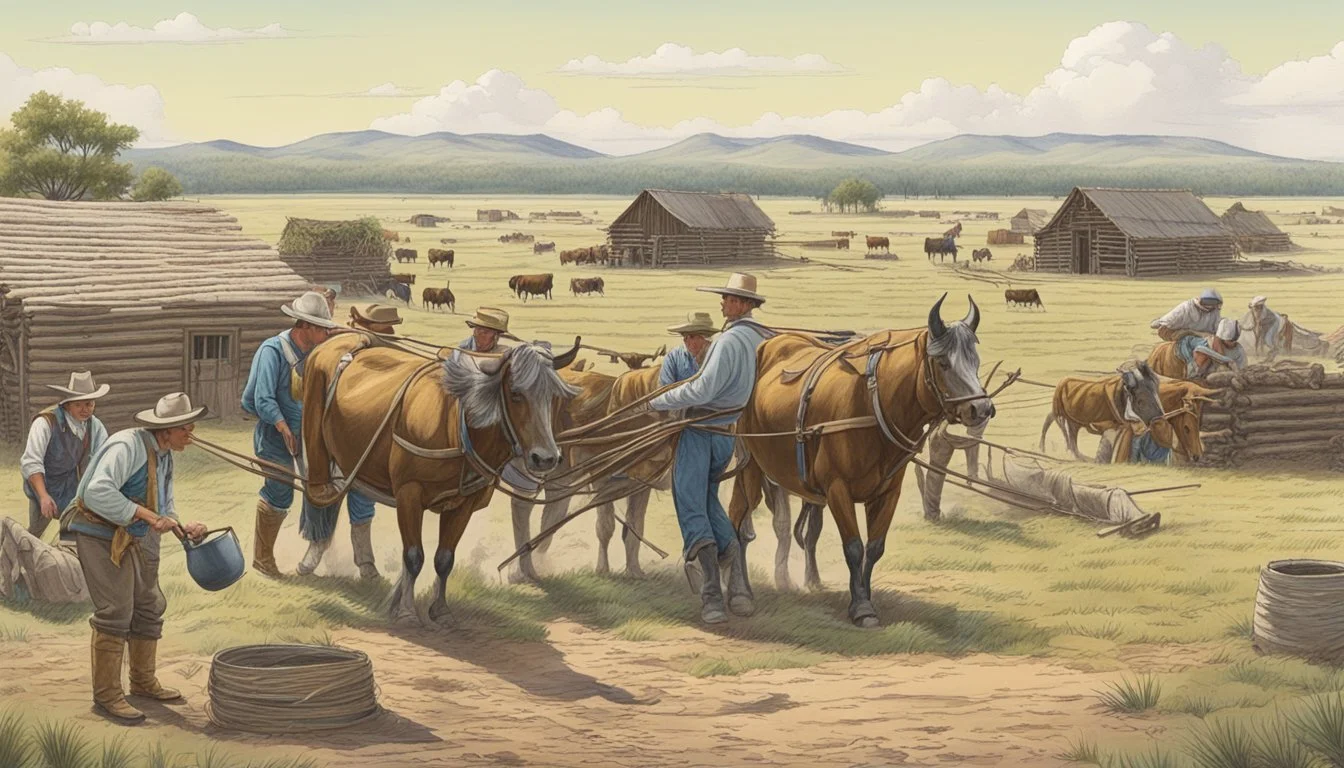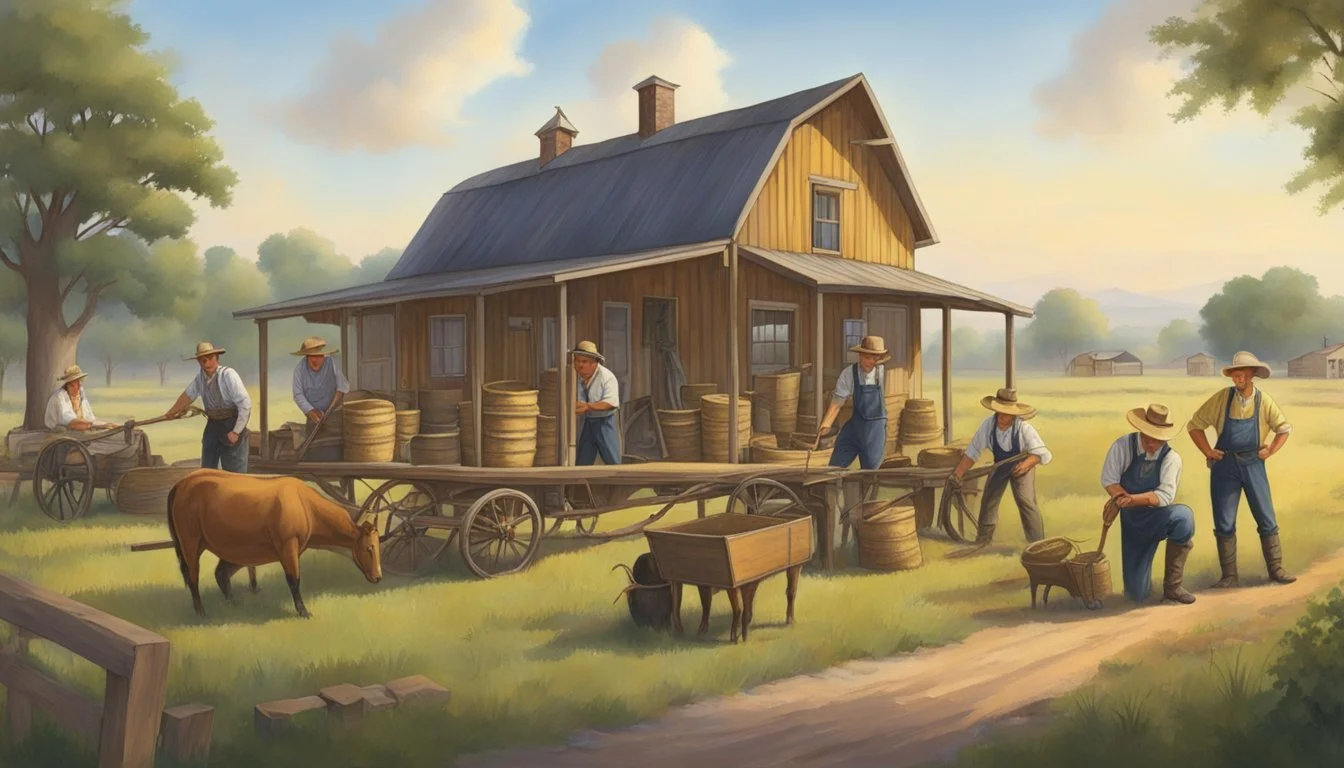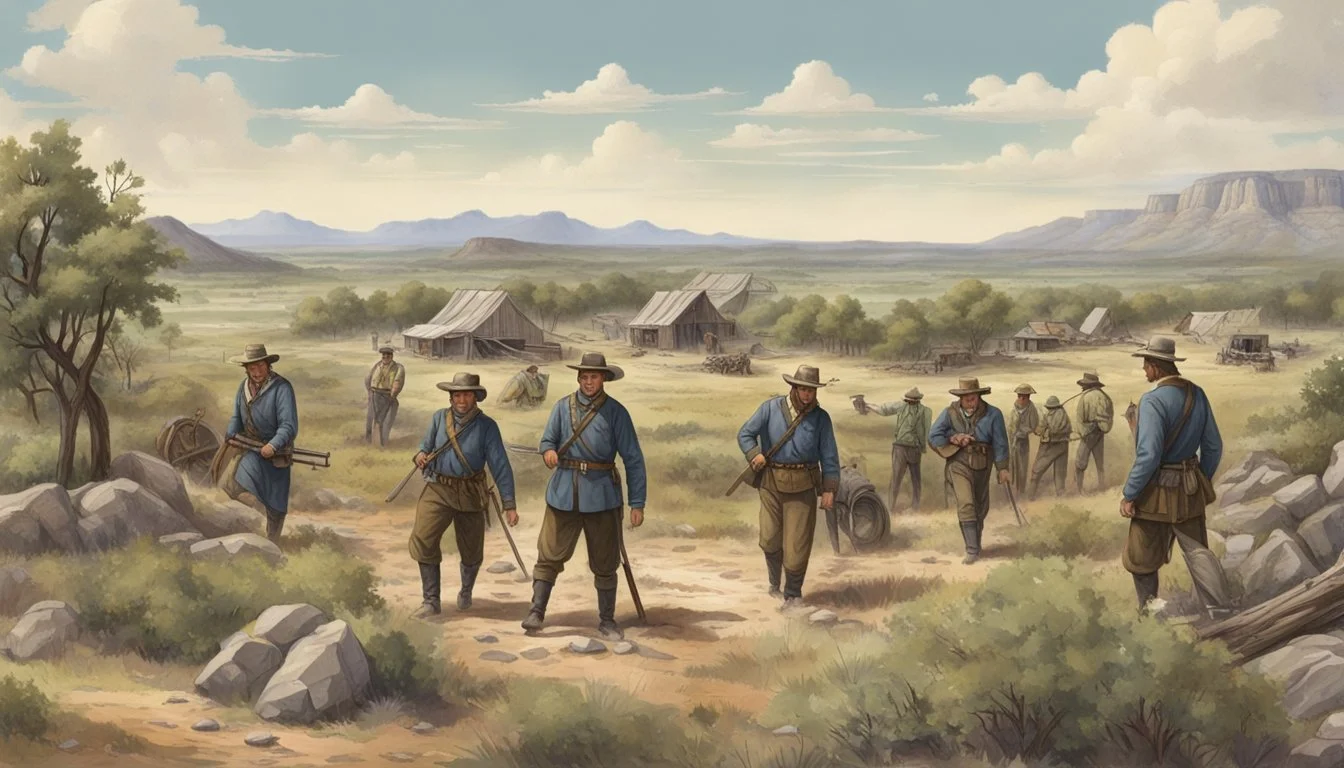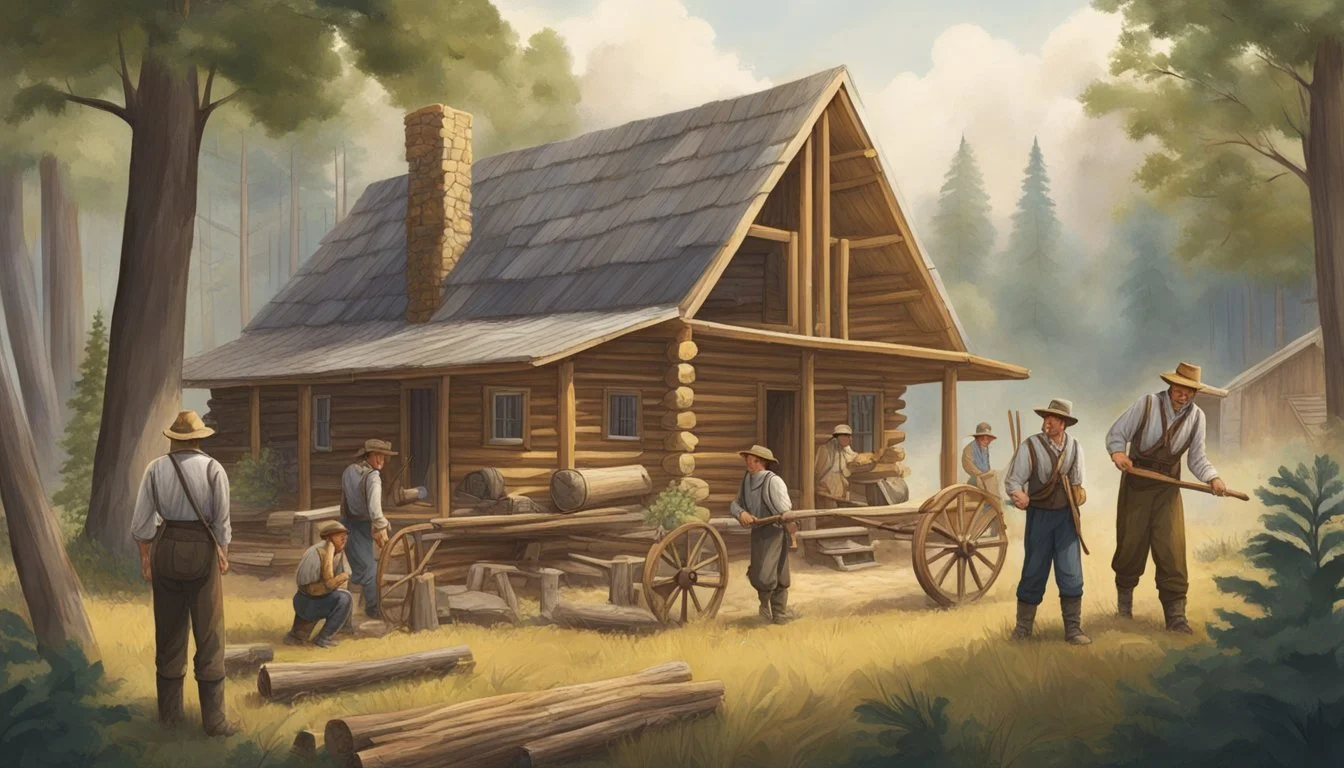German Texan Pioneers
Chronicles of the First Settlers' Lives and Legacies
German Texas pioneers played an integral role in shaping the cultural and social landscape of early Texas. In the years between 1831 and 1850, German settlers commenced a significant wave of immigration, solidifying their presence in the region. These early settlers, attracted by the promise of land and opportunity in the New World, left a lasting impact on the state's development. Many of these Germans hailed from various principalities and states within the German Confederation and were united by a common language and a quest for prosperity and autonomy in Texas.
Initially settling in enclaves such as Industry, Shelby, and Nassau Farm, the German Texans fostered communities that preserved their linguistic and cultural heritage. A notable example was the establishment of New Ulm in 1852, a town named in commemoration of the settlers' origins from Ulm, Germany. Throughout the latter half of the 19th century, Germans constituted over five percent of Texas’ population, and they carved out a niche for themselves primarily through agriculture and industry.
By the turn of the 20th century, the presence of German heritage in Texas was undeniable, with many Texans claiming partial or full German ancestry. Although intermarriage and cultural assimilation have blurred ethnic lines, the influence of those early German pioneers continues to resonate across Texas—evidenced by their contribution to the state’s cultural diversity, economic foundations, and societal structures.
History of German Immigration to Texas
Between 1831 and 1850, a significant wave of German immigration transformed Texas. In 1844, the German noblemen who formed the "Mainzer Adelsverein", also known as the "Verein zum Schutze Deutscher Einwanderer in Texas" (Society for the Protection of German Immigrants in Texas), orchestrated a large-scale movement of German people to Texas. This migration sought to establish a "New Germany" in the heartland of Texas, particularly after Texas gained independence from Mexico.
Early pioneers like Johann Friedrich Ernst from Hesse, often called the "Father of German Immigration to Texas", set the stage for future settlers, inspiring others through "America letters". These personal accounts shared in German hometowns sparked a chain migration, bringing more families to Texan soil. The settlers were predominantly farmers, craftsmen, and intellectuals whose influence would deeply embed itself in Texan culture.
John O. Meusebach, as an agent of the Adelsverein, played a critical role in organizing the settlement and securing land through the Fisher-Miller Land Grant. His legacy includes the founding of New Braunfels in 1845 and Fredericksburg in 1846, alongside the significant Meusebach-Comanche Treaty which assured peace between the German settlers and the Comanche tribe.
By 1847, more than 7,000 German immigrants had arrived, some settling in cities such as Galveston, Houston, and San Antonio. Others formed communities in the rugged Texas Hill Country, like Serbin and Industry, thus shaping what would become known as the German Belt.
The impact of their immigration to Texas is still seen today. German Texans have preserved their genealogy and culture, and those of German ancestry remain a prominent part of the state's demographic landscape.
Early Settlements and Development
Settlement patterns of German Texan pioneers were primarily established through land grants, with immigrants arriving as early as the 1830s. Friedrich Ernst, often hailed as the "Father of German Immigration to Texas," acquired a land grant and settled near what is now Industry, Texas. His success and letters back to Germany spurred further immigration.
New Braunfels and Fredericksburg became two of the most notable settlements. Founded in 1845 by Prince Carl of Solms-Braunfels, New Braunfels flourished in the Guadalupe Valley, forming a pivotal market town. Fredericksburg, settled the following year and nestled in the Texas Hill Country, distinguished itself with unique Sunday house architecture, built for farmers to use on weekends when they came to town.
Ethnic enclaves, known as the "German Belt," spanned across the south-central region, including the Llano River, Pedernales Valley, and Llano Valley. These settlements were rife with diverse professions and cultures, forming a self-sufficient patchwork of communities that stood out within early Texas. German settlers significantly influenced Texas's agricultural industry, with the Cat Spring Agricultural Society being one of their notable communal efforts.
Despite adversities like epidemics and frontier challenges, these persistent settlers established a German presence in areas such as Castell in the Llano Valley, founded by Wends—an ethnic group from Lusatia.
By 1900, Germans represented a significant ethnic group in Texas, as reflected by the United States Census. The Texas State Historical Association further captures the essence of these early German Texan pioneers in the Handbook of Texas, acknowledging their role in the state's development.
Economic Contributions
German Texans played a significant role in the economic development of Texas, contributing to its agricultural wealth and industrial growth. They utilized the land effectively, establishing prosperous communities like Fredericksburg, and brought innovations that bolstered local markets.
Farming and Ranching
German immigrants demonstrated expertise in agriculture, transforming Texas land with their farming and ranching practices. They were pivotal in introducing new agricultural methods, which included the use of windmills for irrigation and the cultivation of various crops suited to the Texan climate.
Crops: Cotton, corn, and wheat were staple crops grown by German Texan settlers.
Livestock: They also excelled in cattle ranching, employing techniques that helped expand the beef market.
The establishment of towns like Fredericksburg became central to these activities, with agriculture serving as a backbone of the local economy.
Business and Industry
In terms of industry, German Texan settlers utilized their artisan skills to foster various business endeavors.
Craftsmanship: They were known for their high-quality craftsmanship in sectors like woodworking and metalworking.
Innovation: German settlers were instrumental in introducing advanced European techniques to Texas industry.
Key industries that saw growth due to the German contribution included:
Brewing: Representing a significant portion of the local market, their breweries catered to a growing demand.
Merchandising: They established businesses that became integral to local trade networks.
By integrating their traditions with local practices, German Texan pioneers helped shape the industrial identity of Texas, influencing its trajectory towards becoming a thriving economic hub.
Cultural Impact
German settlers have profoundly influenced the cultural landscape of Texas since their arrival. It is estimated by the Texas State Historical Association that by the latter half of the 19th century, Germans accounted for nearly 5% of the Texas population.
Their presence is particularly notable in the Texas Hill Country, where towns like Boerne and Comfort still demonstrate a distinctly German heritage. The German impact on Texas is visible in architecture, place names, and community events that preserve and celebrate German traditions.
The integration of German customs with Texan culture has resulted in a unique cultural blend, contributing to the diversity of the state. Industries such as brewing and farming have German roots in Texas, reflecting the skills and trades the immigrants brought with them.
Here are some key impacts of German settlers on Texan culture:
Language: German was widely spoken, influencing local dialects.
Education: Germans established schools that emphasized their native language and culture.
Music: The German love for music enriched the state’s musical tradition, with polka and waltz being incorporated into local celebrations.
Architecture: German influence can be seen in the Fachwerk construction method and the distinctive style of older buildings in German Texan towns.
In terms of population demographics, per the 1990 United States census, a sizeable number of Texans claimed either pure or partial German ancestry, exemplifying how the German community is interwoven into the broader Texas identity.
Through festivals, food, and enduring community values, German Texans continue to play a pivotal role in the cultural diversity of Texas.
Legal and Social Challenges
German immigrants faced a complex tapestry of legal and social challenges upon arriving in Texas. The Adelsverein, a society of German noblemen, orchestrated a significant migration effort. However, they often lacked the experience and resources for such a massive undertaking. Upon arrival, settlers encountered issues with land titles, as the Adelsverein's promises sometimes went unfulfilled due to financial constraints or legal misunderstandings.
Fredericksburg, a notable German settlement, became a hub for German culture but was not without its struggles. Settlers had to navigate the existing legal frameworks, which were influenced greatly by the previous governance of Mexico. Adapting to a new legal system required persistence and flexibility.
The Meusebach-Comanche Treaty, orchestrated by John O. Meusebach, was notable for its peaceful negotiations with the Comanche Indians, showcasing German immigrants' capacities for diplomacy in the face of potential conflict. This treaty helped prevent violence and guaranteed safe passage for settlers through Comanche territory.
The legal landscape was further complicated by the influx of political refugees among the German immigrants. These individuals fled the autocratic regimes in Europe and sought democracy and freedom—values that sometimes clashed with the existing legal structure in Texas.
Key Legal Issues:
Conflicts over land titles
Assimilating into a legal system influenced by Mexican laws
Navigating treaties with Native American tribes
Social Adaptation:
Interacting with diverse populations, including existing Texan settlers, Mexicans, and Native American groups
Establishing settlements such as Fredericksburg while maintaining German identity
Political refugees seeking to reconcile their ideologies with the existing political climate
German Texans persevered despite these adversities, establishing a lasting presence and cultural identity in Texas.
Religious Life and Communities
The religious life of German Texas pioneers was characterized by a strong sense of community and devotion. Ecclesiastical gatherings became the linchpin around which many German Texan settlements were formed, reflecting the diversity in their faith traditions.
Catholic Influences
German Texans of the Catholic faith played a significant role in shaping the spiritual landscape of their communities. Catholic churches served not just as places of worship but also as centers for social life and education. In particular, the town of Serbin became a hub for Wendish Catholics, who, although a minority amongst the German settlers, established the St. Peter and Paul Parish.
Key Figures:
Rev. Johann Kilian – Leader of the Wendish Catholics in Serbin.
Churches:
St. Mary's Church of the Assumption in Fredericksburg
Saints Peter and Paul Parish in New Braunfels
Growth of Protestant Congregations
Protestant Germans also had a profound impact, with many congregations seeing substantial growth during the mid to late 1800s. These congregations often started as small gatherings in settlers' homes and grew to establish notable churches that became cornerstones of their settlements. They created community bonds and provided spiritual guidance to the burgeoning populations.
Denominations:
Lutheran
Methodist
Presbyterian
Notable Churches:
St. Paul Lutheran Church in Serbin
Community Impact:
Facilitated social events
Provided support networks during the expansion and challenges of pioneer life
Military Involvement
German settlers in Texas played notable roles in various military engagements throughout the state's early history. Their contributions spanned from local conflicts with indigenous tribes to their involvement in larger national wars.
Indian Wars
During the Indian Wars, German settlers often found themselves in conflict with the Comanche Indians as they sought to defend their settlements and livelihoods. New Braunfels and Fredericksburg, towns established by German immigrants, served as central locations for mobilizing in defense against raids. Due to the frequent interactions, some settlers developed trading relationships and even rudimentary diplomatic ties with the Comanche to maintain peace.
Civil War
When the Civil War broke out, German Texans found themselves in a complex position. Many had anti-slavery sentiments and supported the Union cause, leading to internal strife within Texas. The most notable example was the Nueces massacre where 35 German Texans attempting to flee to Mexico were killed by Confederate forces. However, it is important to note that perspectives and allegiances varied, and some German Texans did fight for the Confederacy.
World Wars
In World War I and World War II, German Texans' loyalties were primarily to the United States, despite their ancestral ties to Germany. They served in various capacities within the U.S. military forces. During both conflicts, it was common for German-American soldiers to utilize their language skills for intelligence purposes and as translators, bridging the gap between the two nations in the context of war.
Notable Personalities
The tapestry of Texan history is rich with German threads, woven prominently by the hands of key figures who shaped its early development.
Founders and Leaders
John O. Meusebach John O. Meusebach left a permanent imprint on German-Texan heritage. As a founder of Fredericksburg, he exemplified leadership and vision that were pivotal during the settlement era. He negotiated a peace treaty with the Comanche Nation, which was crucial for the safety and expansion of German communities in Central Texas.
Johann Friedrich Ernst Johann Friedrich Ernst, often recognized as the "Father of German Immigration to Texas," ignited the chain migration that brought waves of Germans to Texas. After arriving in 1831, his letters home described Texas as a land of opportunity, spurring others to follow and establishing a German presence in the early days of the state.
Influencers on Education and Thought
German settlers significantly influenced education, establishing numerous schools that cherished their heritage while advancing learning. They fostered an environment that valued intellectual thought, reflecting the diverse perspectives they brought with them to Texas. German pioneers contributed to a unique cultural landscape, blending Texan and German traditions, and leaving their mark on the state’s educational and cultural institutions.
Preservation of Heritage
The preservation of German Texan heritage involves concerted efforts by societies and cultural events in maintaining a connection to the early settlers' culture and language.
Historical Societies
Texas State Historical Association plays a vital role in documenting the legacy of German Texans through the publication of the Handbook of Texas. This initiative, undertaken by the University of Texas Press, offers an extensive collection of entries related to the German impact on Texas culture, history, and the "German Belt" region.
The Handbook of Texas: A digital encyclopedia with comprehensive coverage of German-Texan history.
Cultural Festivals
Cultural festivals serve as a living testament to the enduring legacy of early German pioneers in Texas. The preservation of Texas German, a dialect unique to the region, is often celebrated and promoted at such events.
Texas German Festivals:
Oktoberfest celebrations in Fredericksburg and New Braunfels
Wurstfest, a sausage festival that also honors German heritage
These events highlight historical ties, with traditional music, dance, and authentic German cuisine (What Wine Pairs Perfectly With German Cuisine), further embracing and preserving the rich cultural identity of German Texans.
Modern-Day Communities and Influence
The German influence in Texas remains strong to this day, long after the initial waves of settlers arrived in the state. Texas boasts a significant population claiming German descent, a legacy of the early German settlements. These communities continue to play a vital role in shaping the cultural identity of the region.
Cultural Celebrations German Texans maintain a variety of cultural traditions through annual events such as Oktoberfest and Wurstfest. These festivals feature traditional music, dance, food, and attire, allowing German cultural heritage to thrive within modern society.
Architecture Across Texas, German architectural influences are visible in both public and private structures. This includes the iconic "Sunday Houses" and the design of the Texas State Capitol’s interior, which incorporates German craftsmanship.
Cities with Notable German Heritage Fredericksburg New Braunfels Boerne Walburg
Language and Education Although the German language has seen a decline in everyday use, its presence is preserved through educational institutions. Schools such as the German-Texan Heritage Society offer classes and events aimed at keeping the German language and literature alive.
Economic Contributions German Texans have been instrumental in the economic development of the state. They have founded banking institutions, breweries, and various businesses, weaving their work ethic and customs into the fabric of Texan commerce.
In essence, German Texans contribute to a multilayered society, enriching Texas with a blend of tradition and contemporary influence. Their impact is a testament to the enduring bond between the Lone Star State and its German heritage.
Resource List
The following resources provide valuable information for those researching the history of German Texan pioneers and early settlers. They include archives with original documents, libraries with extensive collections, and digital platforms that facilitate remote access to historical records.
Archives and Libraries
Sophienburg Museum and Archives
Location: New Braunfels, TX
Focus: Local history, German Texan heritage
Contact: (830) 629-1572
Briscoe Center for American History
Location: University of Texas, Austin, TX
Focus: Diverse history collections, including German American resources
Contact: Online contact form or (512) 495-4532
Texas State Historical Association (TSHA)
Focus: Comprehensive Texas history, Handbook of Texas
Publications: Handbook of Texas available online
Contact: Online contact form
University of Texas Press
Focus: Scholarly publications including works on Texas history
Note: They offer a variety of books that detail German influences on Texas history.
Contact: Online store or (512) 232-7600
Online Resources
Handbook of Texas Online
Description: A digital state encyclopedia by the TSHA
Features: Articles on German Texan settlers, culture, and influence
Portal to Texas History
Description: A digital repository hosted by the University of North Texas
Features: Historical texts, photographs, maps, and documents related to German Texans
By utilizing the above resources, researchers can gain a comprehensive understanding of the contributions and experiences of German pioneers in Texas.









